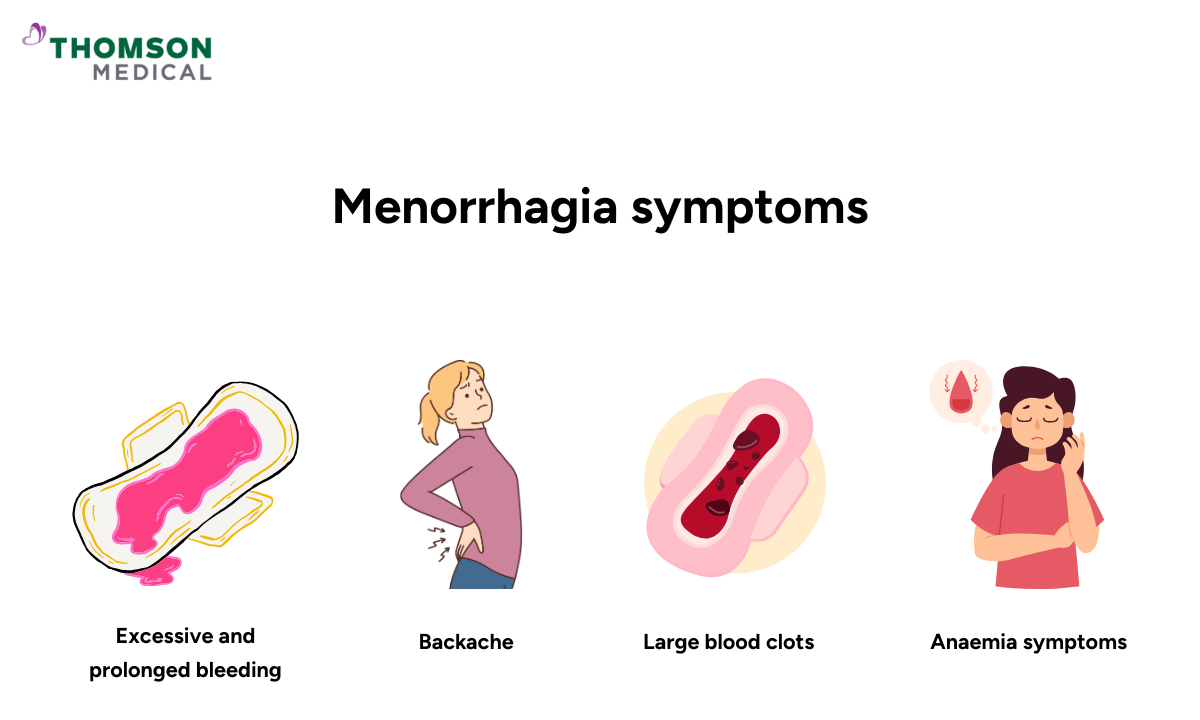During your period, you may have noticed that your flow is becoming heavier and longer, with large blood clots passing. This condition can be so uncomfortable that it affects your work and quality of life. If these conditions describe your menstrual experience, you are probably experiencing menorrhagia.
To help you through this challenging condition, let's take a closer look at what's happening in your body and how to manage these menstrual abnormalities.
What is menorrhagia?
Menorrhagia is the medical term for abnormally heavy or prolonged menstrual bleeding. While a normal menstrual cycle lasts between 21 and 35 days (averaging 28 days), with bleeding typically lasting 3 to 7 days, menorrhagia causes menstrual bleeding to last for more than seven days or become significantly heavier than usual.
The amount of blood lost during menstruation can vary between women, making it difficult to determine what's considered normal. As a result, some women may perceive themselves as having heavy periods while actually experiencing normal blood loss and vice versa.
Menorrhagia symptoms

If an egg is not fertilised during your menstrual cycle, the lining of your uterus will shed during your period. Although periods can be uncomfortable, they should not prevent you from carrying out your daily activities. However, there are symptoms of heavy menstrual bleeding that you should be aware of. These include:
Excessive bleeding:
Needing to change sanitary pads or tampons every hour for several consecutive hours
Prolonged bleeding:
Menstrual periods lasting longer than 7 days
Large blood clots:
Passing large blood clots during menstruation multiple times per day
Backache and pelvic pain:
Persistent back pain or pelvic discomfort
Anaemia symptoms:
Fatigue, weakness, or shortness of breath due to blood loss
These symptoms can affect your quality of life, affecting everything from work performance to personal relationships. Understanding the potential causes and seeking appropriate medical care is crucial for proper diagnosis and treatment.
Causes of menorrhagia
Menorrhagia can have many causes, ranging from hormone-related issues to medical conditions or medications. However, in some cases, the reason for heavy menstrual bleeding is unknown. Here are several conditions that may cause heavy menstrual bleeding:
Hormonal imbalances:
Imbalances in oestrogen and progesterone hormones can cause the endometrium (lining of the uterus) to develop excessively, leading to heavy bleeding.
Several conditions can cause hormone imbalances. These include being overweight, insulin resistance, thyroid problems, and polycystic ovary syndrome (PCOS).
Uterine conditions:
Fibroids (noncancerous growths) in the uterus can cause heavy bleeding and pain.
Polyps (small, benign growths) on the lining of the uterus can lead to heavy periods.
Adenomyosis occurs when endometrial tissue grows into the uterine wall, causing heavy bleeding and pain.
Bleeding disorders:
Von Willebrand disease is a genetic disorder that affects blood clotting.
Platelet function disorders affect the blood's ability to clot properly.
Medications:
Anticoagulants, or blood-thinning medications, can worsen bleeding.
Some hormonal medications, intrauterine devices (IUDs), or treatments can affect menstrual flow.
Pregnancy-related issues:
Heavy bleeding during pregnancy can indicate a miscarriage.
Ectopic pregnancy (pregnancy outside the womb) can cause severe bleeding and is classified as a medical emergency.
If you suspect that you may have menorrhagia, don't hesitate to consult an obstetrician and gynaecologist (O&G) specialist. Schedule an appointment with Thomson Women's Clinic, where our O&G specialists can help perform further diagnosis and provide tailored recommendations.
Our O&G specialists
Loading...
Diagnosis of menorrhagia
During your consultation with your doctor, they will enquire about your medical history and whether or not you have any abnormal menstrual cycles. You will also have a physical exam, including a pelvic exam. You may be asked to keep track of your periods and how many pads or tampons you use for a few months.
Following a physical exam, your doctor may recommend additional procedures, such as:
Blood tests:
A blood test is used to check for iron deficiency anaemia and if there's any other blood condition, such as thyroid disease or blood-clotting problems.
Ultrasound:
An ultrasound imaging is used to examine the uterus, ovaries, and pelvis to check for fibroids or other problems.
Pap test:
In a Pap test, cells from your cervix are collected. They are tested for inflammation or changes that may be precancerous, which means they could lead to cancer.
For women aged 30 and older, HPV testing may also be performed alongside the Pap test.
Hysteroscopy:
During a hysteroscopy, a thin, lighted instrument is inserted through the vagina and cervix into the womb to check for abnormalities and to remove polyps or other causes of bleeding.
Endometrial biopsy:
During an endometrial biopsy, your doctor may take a tissue sample from the inside of your womb. A pathologist will look for signs of cancer or pre-cancer in the womb.
Sonohysterography:
During this test, a fluid is injected through a tube into your uterus by way of your vagina and cervix. Your doctor then uses ultrasound to look for problems in the lining of your uterus
For personalised information about menorrhagia diagnosis and which tests are right for your condition, schedule an appointment with Thomson Women's Clinic.
Treatment for menorrhagia

What treatment you receive for heavy menstrual bleeding depends on the cause of your bleeding, how severe it is, your general health, age, and whether you plan to have children. This is because menorrhagia sometimes improves without treatment.
This tends to be more common when the cause is mild hormonal fluctuations or conditions such as being overweight. However, the following treatments for heavy menstrual bleeding can be performed:
Medications
If your condition is mild, your healthcare provider may recommend medication before considering surgical treatment. Some possible options include:
Non-steroidal anti-inflammatory drugs (NSAIDs), such as ibuprofen, which can relieve pain and reduce blood loss during menstruation.
Hormonal therapy, such as birth control pills, hormonal IUDs or progesterone treatments, can help regulate your cycle and reduce bleeding.
Hormone replacement therapy (HRT) can balance oestrogen and progesterone levels to reduce heaviness in your menstrual flow.
If you have anaemia due to heavy menstrual bleeding, you may need to take iron supplements. On the other hand, if your iron levels are low but you are not yet anaemic, you may be prescribed iron supplements as a preventive measure.
Surgical interventions
If medication doesn't improve your heavy menstrual bleeding, your doctor may recommend a surgical procedure. The type of procedure depends on the cause of your bleeding and your future fertility plans. Some surgical options include:
Hysteroscopy:
This procedure can diagnose and treat heavy period bleeding by using a thin, lighted tube to see inside your uterus and remove polyps or other causes of bleeding.
Dilation and curettage (D&C):
A D&C is a procedure that involves dilating the cervix and scraping or suctioning tissue from the outermost layer of the lining of your uterus (curettage).
You may have a D&C to locate the source of abnormal uterine bleeding. Your provider can send the tissue to a lab to see what's causing the bleeding.
Myomectomy:
Myomectomy is the surgical removal of uterine fibroids while preserving the uterus. The procedure can be performed through small abdominal incisions (laparoscopic approach) or through the vagina and cervix (hysteroscopic approach).
Uterine artery embolisation:
Uterine artery embolisation is a minimally invasive procedure that restricts the blood flow from fibroids, causing them to shrink.
Endometrial ablation:
Endometrial ablation is a procedure that uses laser, radio waves, or heat to remove the uterine lining. After endometrial ablation, you may have much lighter periods.
However, after this procedure, pregnancy is strongly discouraged due to increased risks of complications.
Hysterectomy:
A hysterectomy is surgery that removes the uterus, which prevents a woman from having periods or getting pregnant. Given that it necessitates the removal of the uterus, it is typically viewed as a final option.
Your healthcare provider will consider your age, overall health, and personal preferences when deciding the suitable treatment for you. Treatment typically begins with medication and may progress to surgical options if conservative treatments are unsuccessful. Many surgical procedures are performed on an outpatient basis, allowing you to go home the same day.
Menorrhagia treatment cost in Singapore
Most menorrhagia treatments begin with medication, which typically costs SGD 10-300 per month depending on the type prescribed. For longer-term solutions like hormonal IUDs, the upfront cost can be SGD 400-1,000, but this provides 5-8 years of treatment.
However, if surgical intervention becomes necessary, the cost varies depending on the procedure complexity and whether you choose a public or private hospital. At Thomson Women's Clinic, our obstetrics and gynaecology (O&G) specialists offer surgical interventions that are suitable to help treat this abnormal menstrual bleeding.
Myomectomy:
A myomectomy procedure cost can range from SGD 8,000 to SGD 25,000 depending on the surgical approach.
Hysteroscopy:
A hysteroscopy procedure cost can range between SGD 696 and SGD 8,326, depending on the complexity of the procedure.
Hysterectomy:
A hysterectomy procedure cost can range from SGD 25,800 to SGD 53,340 depending on the type and complexity of the procedure.
However, additional charges may arise for expenses such as pre-surgery consultations, imaging tests (e.g., X-rays or CT scans), medications, and post-surgery follow-up appointments.
Fortunately, there are several programmes in Singapore that can help lower the total cost, such as MediSave, MediShield Life, and Integrated Shield Plans. Each of these offers different levels of coverage for your hysteroscopy, depending on your eligibility and insurance arrangements.
This price was last updated in June 2025. Therefore, hysteroscopy costs may have changed since then. For more information, contact our medical concierge who can provide detailed guidance based on your specific situation.

FAQ
What is considered a heavy menstrual bleeding?
A period is considered heavy if you need to change your pad or tampon every hour for several consecutive hours, bleed for more than 7 days, or pass clots larger than a quarter. If your periods interfere with work, social activities or your daily life, this may indicate menorrhagia, which requires medical attention.
Can menorrhagia cause anaemia?
Yes, as significant blood loss from heavy periods can lead to iron deficiency anaemia. Symptoms include fatigue, weakness, shortness of breath, pale skin and dizziness.
What causes back pain during heavy periods?
Back pain during menstruation is caused by uterine contractions triggered by prostaglandins, which are hormone-like chemicals that help to shed the uterine lining. However, severe back pain may indicate underlying conditions such as fibroids, adenomyosis or endometriosis.
Can hormonal birth control help with menorrhagia?
Yes, hormonal treatments, such as birth control pills, hormonal intrauterine devices (IUDs) and progesterone therapy, can effectively regulate cycles and reduce heavy bleeding.
What are the surgical options for treating menorrhagia?
Surgical options include hysteroscopy, dilation and curettage (D&C), myomectomy (fibroid removal), endometrial ablation and hysterectomy. The most suitable option will depend on the underlying cause, your age, and whether you plan to have children.
Are there any home remedies for managing heavy periods?
Supportive home remedies include eating iron-rich foods to combat anaemia, taking ibuprofen or naproxen, exercising regularly and managing stress. However, home remedies should complement, rather than replace, medical treatment.
It is essential that you seek a professional evaluation if you need to change your pad hourly or if your symptoms are interfering with your daily life.
The information provided is intended for general guidance only and should not be considered medical advice. For personalised recommendations and tailored advice, schedule an appointment at Thomson Women’s Clinic.
For more information, contact us:
Thomson Specialists (Women's Health)
Thomson Women's Clinic (TWC)
- Novena:
6592 6686 (Call), 8611 8986 (WA) - Bukit Batok:
6569 0668 (Call), 8686 3525 (WA) - Choa Chu Kang:
6893 1227 (Call), 8282 1796 (WA) Jurong:
6262 8588 (Call), 6262 8588 (WA)- Katong (female doctor):
6970 2272 (Call), 8611 9020 (WA) - Punggol:
6243 6843 (Call), 8811 0328 (WA) - Sembawang: 6753 5228
- Sengkang: 6388 8125
- Serangoon (female doctor): 6382 3313
- Tampines: 6857 6266
- Tiong Bahru: 6276 1525
